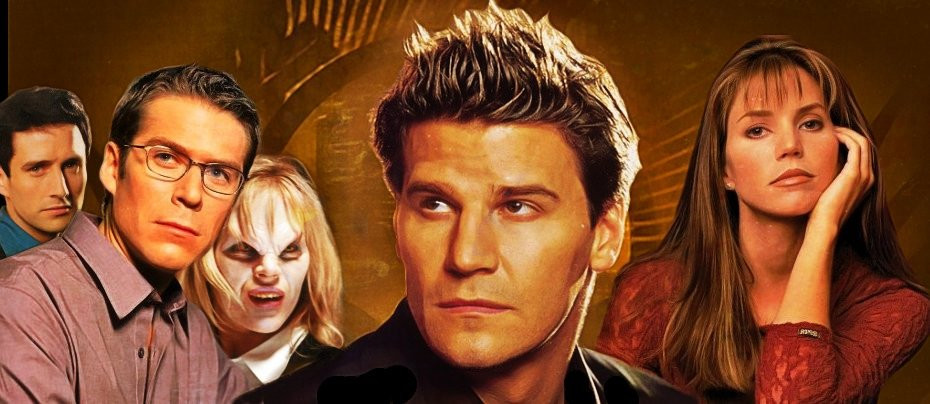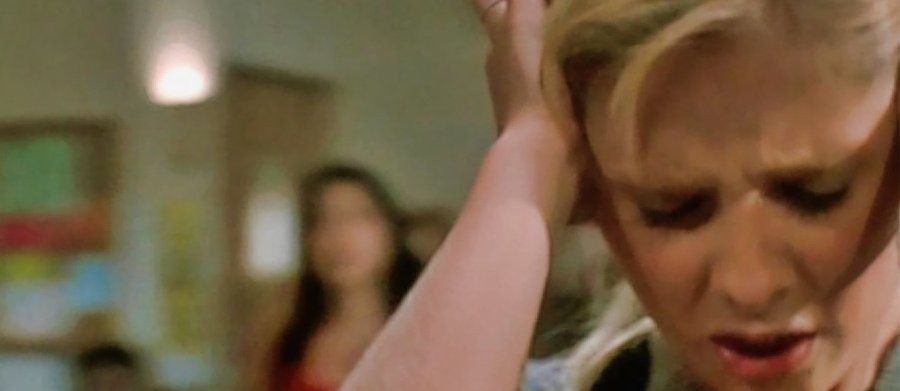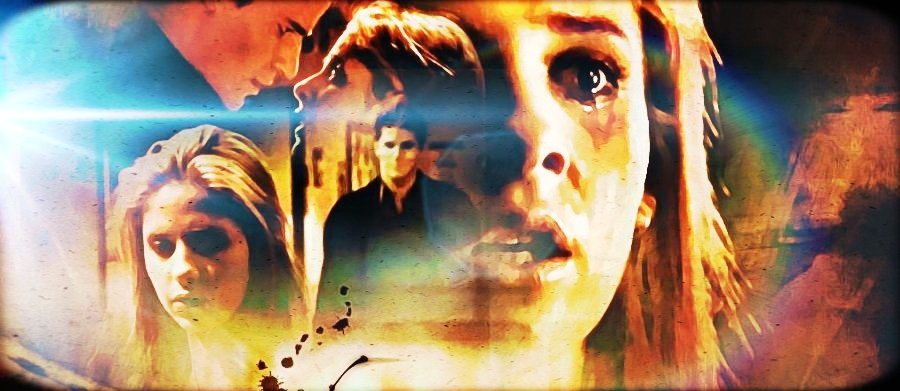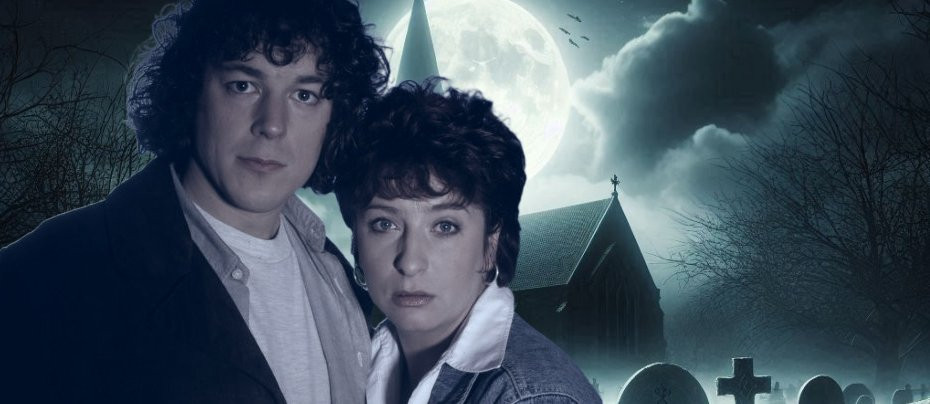
Buffy the Vampire Slayer - Season 6
To revolve the core story around depression, addiction, despair and abuse was a brave move, and one that pushed the series fully into adulthood
Buffy the Vampire Slayer – Season Six (2001-02) review by Daniel Tessier
The sixth season of Buffy the Vampire Slayer saw the series move from its original home on the WB to UPN, a change that rescued it from imminent cancellation. Joss Whedon worked intently on a single, tentpole episode, while his attention was otherwise diverted by his upcoming new series, Firefly. Marti Noxon was promoted to executive producer, effectively setting her up as showrunner. David Fury was promoted to co-exec producer and took writing duties for several of the series' most essential episodes, with Douglas Petrie and Jane Espenson as producers and regular writers. Steven DeKnight and Rebecca Rand Kirshner became story editors and also wrote scripts, along with the newly recruited Drew Z. Greenberg (Smallville, Arrow, Dexter).
This goes some way to explaining why this season feels more disjointed than others. Season six moves the series into new and darker directions, but also seems more frivolous and often less consequential. There's a lack of focus that Whedon would likely have provided. The season never quite gels, in spite of featuring some truly excellent material and brave story choices. Notably, it's a rather more depressing season than others, and it's not like earlier seasons didn't have their fair share of tragic and brutal events.

Star Sarah Michelle Gellar has candidly spoken about her feelings for the season, saying that she feels Buffy was made to act in ways that weren't true to her character. In 2017, she spoke to Entertainment Weekly, saying: "I've always said that season six was not my favourite. I felt it betrayed who she was. Even just getting to talk to Joss and be able to get his opinion was not as easy when he's not upstairs.”
She continued: "He had three shows. He had Angel and Firefly so that was hard. But he made sure to dedicate the time to season seven and that was his promise to me: that we would right all the wrongs and he kept that promise." Clearly Gellar agreed that Whedon's absence was detrimental to the season, although given his now notorious clashes with his cast, it no doubt made for a better working environment for many.
Whedon, on the other hand, was very happy with the season, considering that his and Noxon's desire to write about unhealthy relationships was a successful one. In spite of his lighter touch on the season, it was still his original storyline that shaped it. It's no mistake, though, that this season pushed many of its characters in much darker directions, dealing with themes not only of abuse, but also depression, misogyny and addiction.

Simply following season five was a challenge, as well. How do you successfully follow the death of the lead character in what was written to be the series finale? Fortunately, it's hardly a challenge for a fantasy-horror series to bring a character back from the dead, but that brings its own problems. Bringing Buffy back ran the risk of making her noble sacrifice seem wasted, so it was essential for her resurrection to have consequences. The opening two-parter, “Bargaining,” picks up five months after the end of season five, showing the Scoobies struggling to maintain the supernatural safety of Sunnydale. Giles (Anthony Stewart Head) has finally made the decision to leave and return to England (departing partway through episode one), leading to a diminished role this season. Willow (Alyson Hannigan) has been steadily growing her powers, making her both the de facto leader of the group, but also pushing her into increasingly dangerous territory. Xander (Nicholas Brendon) and Anya (Emma Caulfield) are engaged, although Xander has been keeping this on the downlow, possibly having second thoughts following his romantic proposal just before the potential end of the world. Buffy's sister Dawn has been looked after by Willow and Tara (Amber Benson), who have taken the opportunity to move into the large Summers’ house.
In the absence of Buffy, the team have been relying on the reprogrammed Buffybot to stand in for her, both in the field against demons and vampires, and less successfully in mundane everyday life. The authorities seem just about happy with Dawn's home situation. Spike (James Marsters) has also stepped up, fighting the forces of darkness in Buffy's honour (and still unable to hurt anything living, thanks to the computer chip buried within his brain).

Willow comes up with a plan to bring Buffy back from the dead, working with Anya, who is preparing to take over management of the Magic Box from Giles, along with Tara and Xander. It's something of a heel-turn from Tara, who was previously dead against resurrection spells (excuse the pun), but Willow needs someone to stop her going too far. Knowing that the spell may not work, and also that they would likely disapprove, the four of them keep their plans from Giles, Spike and Dawn. The first part ends with their dark and twisted ritual being violently interrupted by a gang of demonic bikers (literal Hell's Angels) who have learned of the Slayer's death. Unknown to the gang, the spell was a success. Buffy wakes up, exactly where they left her: six feet under.
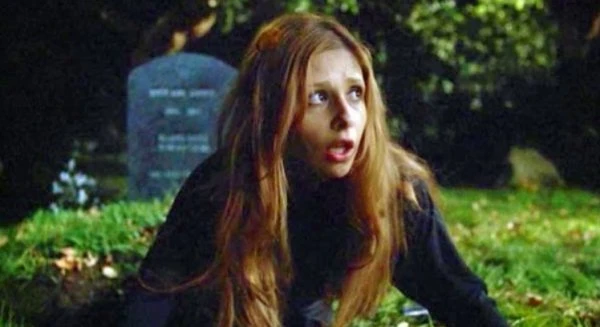
It's an excellent cliffhanger, leading to an equally good second episode, wherein a traumatised Buffy staggers through Sunnydale under siege by demons, and witnesses her robotic duplicate being torn apart. The demons, led by Franc Ross (Days of Our Lives, Better Call Saul), are especially brutal, making explicit threats of rape and mutilation. The episode ends with Buffy ready to kill herself by again leaping off the tower constructed by Glory in “The Gift.” In a touching scene that reverses their roles from the previous story, it's Dawn who comforts Buffy and saves her from herself. When the rickety tower begins to collapse, Buffy's instinct takes over and she again saves Dawn, reaffirming their bond and her role as saviour. In all, the two-parter is a strong opener for the season, marking a distinctly darker approach to the series. On its original showing as a feature-length double-episode, it achieved Buffy's second highest ratings, behind only the game-changing 2.14, “Innocence.”
Given that pretty much everyone goes through the ringer in “Bargaining,” you'd be forgiven for thinking that things get easier from then on, but in fact, everything deteriorates from here. Spike is the only one who takes the dangers of Buffy's resurrection seriously, and is proved right in 6.3, “Real Life,” where a formless demon is revealed to have hitched a ride with Buffy's soul and is doing its utmost to find a new body to inhabit. More significantly in the long run, Buffy reveals to Spike that while her friends had assumed she'd been pulled into a terrible hell dimension, she had in fact passed onto her reward in heaven, only to be ripped from there by Willow's spell. For Buffy, it's life on Earth that is hell, a feeling familiar to anyone who's struggled through life with depression.
6.4, “Flooded,” pushes home the overwhelming nature of everyday, mundane life when depressed, as Buffy must start to try taking care of her sister and home again. Although they inherited money from their mother, hospital and funeral bills have wiped this out (good ol' US of A), and a burst pipe threatens to take Buffy over the edge. Willow and Tara explain the direness of the situation to her and point out that she needs to get a job (the idea of them paying some rent doesn't seem to cross the students' minds. Bloody freeloaders). Giles returns from England to joyfully reunite with Buffy, but in an electric scene, furiously lays into Willow, berating her for actions and calling her a “rank, arrogant amateur.” A momentary threat from Willow hints at the dark path she will soon be following.
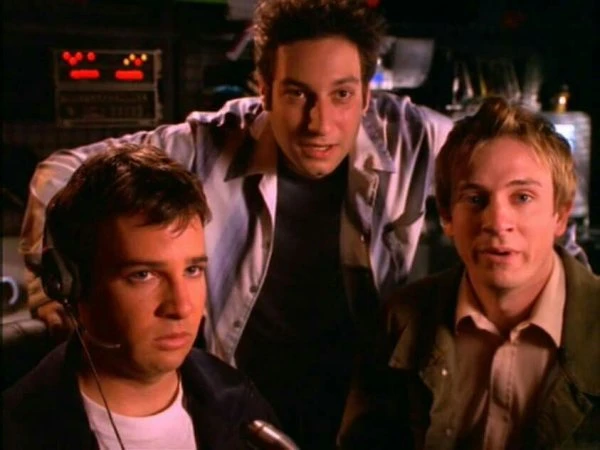
Less successful was the introduction in this episode of the ostensible Big Bads for the season. The Geeky Trio, aka the Crime Lords, are a group of social misfits, trying to takeover Sunnydale seemingly just for something to do. The Trio are an odd choice for overarching antagonists after five years of vampires, demons, sorcerers and hellgods. By far the most threatening is their de facto leader, Warren Mears, played by Adam Busch, who had appeared the previous season, firstly in 5.15, “I Was Made to Love You.” The creator of the Buffybot, Warren is a deeply misogynistic bully, who of course sees himself as the downtrodden, mistreated party. In the age now of incels and Men's Rights Activists, Warren's character is all the more recognisable and topical. With him are the once-lovable Jonathan Levinsen (Danny Strong), the shy nerd who had appeared repeatedly since 2.4, “Inca Mummy Girl,” and Andrew Wells, an outcast even among outcasts. Insecure, closeted, not-so-secretly in love with Warren, Andrew is known merely as the brother of Tucker Wells, who had unleashed the hellhounds on 3.20, “The Prom.” That is, when people remember who he is at all.
All three give excellent performances, with Tom Lenk (Much Ado About Nothing, Lovin' Lakin) standing out in particular, but they have to deal with some very poor material. The Trio are, by their nature, laughable, so they're frequently played for laughs. This isn't necessarily a problem; indeed, the contrast between their silliness and the threat they pose often works well. It's more that the quality of both the comedic and dramatic material is often low. The following episode, “Life Serial,” sees Buffy try to make it in various jobs, only as the Trio put various obstacles in her way, and simply fails on both comedic and dramatic levels. (It does, however, introduce James C. Leary as the friendly, saggy-skinned demon Clem, who becomes a delightful recurring character.)
Later episodes continue to paint the Trio as rather low-level comic book villains, with 6.9, “Smashed,” seeing Warren construct a freeze-ray, and 6.11, “Gone” seeing them accidentally turn Buffy invisible. That's not to say these episodes don't include some strong material, and as the season continues, the threat posed by the Trio, particularly Warren, and their effect on Buffy's already struggling mental health, only grows.
6.6, “All the Way,” is Buffy's biennial Hallowe'en episode, and gives us a soapier instalment that captures some of the feel of the show's earlier days. From the beginning of the season, Dawn's behaviour has been slowly becoming more delinquent, and she has begun shoplifting as a way of coping with the emotional upheaval in her life. It's not unusual for a fifteen-year-old to act up when struggling, and they normally don't have to cope with almost causing the end of the multiverse, or facing their sister's death and resurrection.
The episode starts out looking like it's going in one direction before going in quite another. When Dawn and her friend Janice (Amber Tamblyn – Joan of Arcadia, Two and a Half Men, Y: The Last Man) – oft-mentioned but only seen this one episode – join up with two handsome older boys, they decide to Trick or Treat the home of an distinctly creepy old man (veteran actor John O'Leary, who was in everything from 1950 to his death in 2019). Naturally, we're expecting the old man, who sings nursery rhymes to himself and wanders around with a carving knife for his baking, to be revealed as some sadistic monster. In a classic example of Buffy horror trope reversal, he becomes the victim, as Justin (Kavan Reece – Life on Top) and Zack (Dave Power – For All Mankind) are revealed to be vampires.
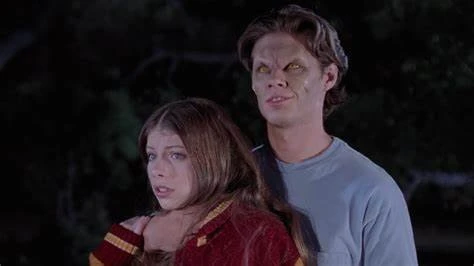
As Dawn experiences her first kiss with Justin, we get to enjoy a truly teenaged slice of Sunnydale life for the first time in a while. When Buffy becomes aware that Dawn lied to her about her whereabouts, and that she's been cavorting with vampires, she reacts as you'd expect: angrily and rather hypocritically. After all, she was lying to her mother and sneaking out to fight vampires at fifteen, kissing them at sixteen and sleeping with them at seventeen. It's a great way to show how Buffy has grown up and moved on, and the series with her. Dawn actually handles herself well – Justin becomes her first vampire slay – beginning a gradual movement to a more equal relationship between the sisters. Meanwhile, Xander and Anya finally announce their engagement, while Tara and Willow fight over the latter's increased dependence on magic to get things done. Willow then performs her first truly shocking act of betrayal, erasing Tara's memory of the fight, not even considering how this would affect her partner (whose mind was invaded by Glory only months before). Giles also comes to question his position; his advice to Xander only serves to increase the young man's anxiety, and Buffy is relying on him more and more to deal with Dawn and her adult responsibilities.
After a somewhat shaky start to the season, with six episodes of varying quality, comes one of the series' single most beloved and ambitious episodes. “Once More, With Feeling” is the legendary Buffy musical, a truly spectacular event that upends the show's format in gloriously entertaining style, while still moving on the season's running plots. An absolute must-see, it's no surprise that this episode is both written and directed by Joss Whedon, and its scope shows why his involvement with the season was reduced to one episode.
A debonair, dancing demon named Sweet arrives in Sunnydale, cursing everyone in the town so that they keep bursting into perfectly choreographed song-and-dance numbers. Unable to stop themselves, they reveal their innermost thoughts, desires and secrets. Naturally, this threatens huge emotional fallout, but to begin with, everything seems to be in fun. It's only later that we discover that Sweet’s curse, if left to run, will cause people to literally dance themselves to death, with a fiery, show-stopping finish.
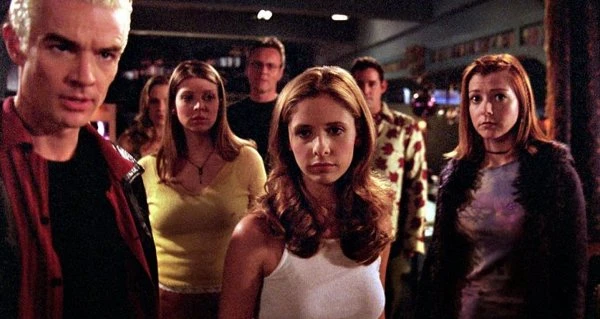
Surprisingly, most of the cast were not trained singers or dancers prior to production, with only Head (a veteran of musical), Marsters and Benson (both career singers) previously having singing experience. Although they're clearly the strongest, singing lessons for Gellar, Brendon and particularly Emma Caulfield clearly paid off, and they all do a tremendous job. Gellar has commented to the BBC that she took “something like nineteen hours of singing and seventeen hours of dancing in between shooting four other episodes.” Gellar found the focus on her as a singer very anxiety-inducing, but was determined to do it, rather than rely on another singer dubbing for her. On the other hand, neither Trachtenberg nor Hannigan are singers at all. Trachtenberg, a trained ballerina, instead had an extended and rather beautiful dance sequence, and her singing, while competent, is kept to a minimum. Willow, on the other hand, gets only two lines of song, and Hannigan basically speaks them.
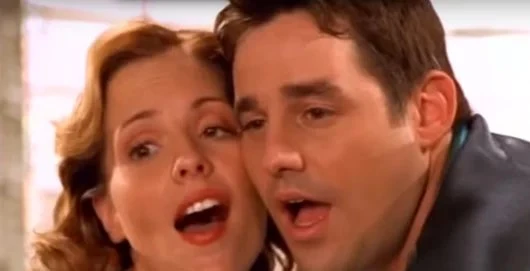
The songs are astonishingly good, with lyrics that advance the plot, explore the characters' deepest feelings and remain irresistibly singable long after you've seen the episode. They range from the beautiful (and hilariously, sneakily rude) love song “Under Your Spell” sung by Benson as Tara, to Spike's yearning rock song “Rest in Peace,” with Marsters providing both vocals and guitar. There are duets (Brendon and Caulfield's jaunty “I'll Never Tell”) and show-stopping numbers featuring all the cast (“I've Got a Theory” beginning a medley early in the episode, while “Where Do We Go From Here?” rounds things out). Tony Head stands out with his solo “Standing,” where Giles decides to finally move on for good, while Gellar holds her own with the opening song “Going Through the Motions” and the climactic “Something to Sing About.”

Guest-starring as Sweet is the decorated Broadway veteran Hinton Battle, fresh from The Wiz: A Super Soul Musical, a slick and slippery demon who, of course, gets his own number. There are some fun cameos from the producers as well: both Marti Noxon and David Fury get to perform snapshots of songs by passers-by (Noxon is arguing against a parking ticket, while Fury got the mustard out). Christophe Beck arranged the music that Whedon had composed, with Adam Shankman and Anne “Mama” Fletcher choreographing some incredible dance numbers. Whedon's direction is on point, with photography techniques chosen to enhance the cinematic feel of the episode, which was also the longest in the series' history. (Only by eight minutes, but even being allowed that much leeway was remarkable in syndicated and broadcast television.)
Finally, of course, the demon is defeated, but only after Buffy has dropped the bombshell (via song, naturally) that her friends pulled her out of heaven. Only Spike, on whom Buffy has been placing all of her emotional baggage, is able to stop her from burning up and convince to her to give life another chance. When the final song starts up, to help the characters come to terms with what they've just experienced, Buffy and Spike sneak off, and finally share a climactic kiss.
“Once More, With Feeling” is a hard act to follow, but 6.8, “Tabula Rasa” by Rebecca Rand Kirshner and director David Grossman comes close. Having discovered that she has tampered with her memory, Tara confronts Willow over her reliance on, and abuse of, magic. With their relationship on the line, Willow promises to go a week without using any magic. This lasts about ten minutes, as she tries to use the same spell to make Tara forget this again, and to remove Buffy's memories of heaven.

Predictably, it goes horribly wrong, with the spell erasing the entire gang's memories. Holed up in the Magic Box, they try to work out their identities from what little clues they have to hand. In some ways, they're spot-on; Buffy and Dawn quickly realise they're sisters. On the other hand, they're mostly way off the mark. Giles and Anya work out that they run the Magic Box together, but deduce that they're married, while being the only two Englishmen in the room, Giles and Spike come to the conclusion that they're father and son. Spike, in disguise as he is hiding from a loan shark (literally a humanoid shark in a suit), wears a second-hand brown tweed suit (which honestly works for him). The name still on the label convinces him his name is Randy Giles, while Buffy decides her name is Joan, because it feels right.
There are some lovely touches – Xander has his ID, but everyone shortens his name to Alex, and due to their proximity and perhaps some lingering attraction, he and Willow assume they're a couple. An attack by the loan shark and his vampire minions leads Buffy to realise her super-strength and slaying instincts but freaks out when Spike inadvertently vamps out. Since he has no urge to attack Buffy he comes to the obvious conclusion: "I'm a vampire with a soul! I fight evil! I help the helpless!" “That's lame,” retorts Buffy. There are a lot of laugh-out-loud moments, and in any other season it would probably be the funniest episode, but it holds up well against its musical competition. In the commotion, Willow and Tara find themselves drawn together again, only for the crystal that holds the spell intact to be broken. Tara leaves the heartbroken Willow, moving out of the Summers' house, and Giles finally takes his leave to England.
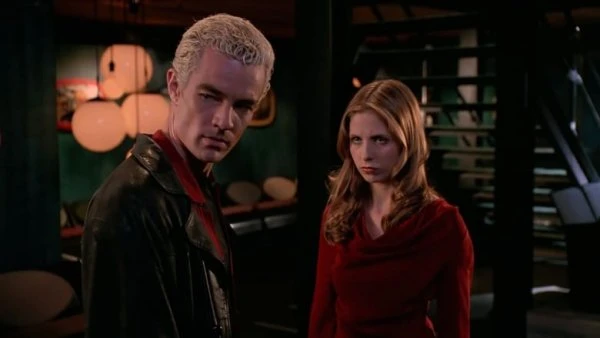
The absence of Giles hits Buffy hard and is likely a factor in her increasingly close relationship with Spike. It's Willow who's left reeling by these events though, and without Tara to hold her at least somewhat in check, she rapidly loses her way. The two-part story “Smashed” and “Wrecked” puts both women through experiences as dark and brutally adult as anything the series has shown so far. Buffy continues to lie to herself about her growing feelings for Spike and becomes aggressive when he tries it on. When he punches her back, he feels no pain, although he fakes the usual headache at first. Initially, he believes that his chip is no longer functioning, allowing him to attempt killing again, but he's soon disabused of that ray of hope. The only explanation is that Buffy somehow “came back wrong,” that she is no longer entirely human. When Spike confronts Buffy with this, she refuses to accept it, leading to a brutal fight between them in an abandoned house. This rapidly develops into an equally violent sex scene, one that quite literally brings the house down around them.
Meanwhile, lonely and lacking purpose, Willow uses her magic on Amy the rat, turning her back into actress Elizabeth Ann Allen. Amy had, if you recall, transformed herself into a rat way back in 3.11, “Gingerbread,” unfortunately leaving herself with no one sufficiently skilled in magic to turn her back – until now. After an understandably tricky period of adjustment, Amy bounces back, taking Willow out for a night of witchy fun. After merrily abusing their powers, they end up in a backstreet magic den run by a seedy and sinister warlock named Rack (an unsettling turn by Jeff Kober, previously the insane vampire Kralik in 3.12, “Helpless”).
Rack trades in powerful magic that is used as an effective, if unsubtle, allegory for recreational drugs. Both Amy and Willow get happily off their faces as reality warps around them. Willow is immediately addicted, going back the next day when she's looking after Dawn, getting high once again before stealing a car, which she crashes, injuring them both. When confronted by Buffy, Willow breaks down, desperately apologising. Later, she realises she needs to stay off the magic, deciding to go cold turkey and stay away from Amy.
The Geeky Trio's crime spree with their freeze-ray adds levity, which makes the episodes easier to watch but threatens to undercut the seriousness of the main storylines. Nonetheless, these episodes feature some truly uncompromising and uncomfortable material. There's an interesting similarity between Willow's addiction to magic and Buffy's attitude to Spike, who she can't keep away from in spite of her disgust at him and herself. Spike is both violent towards Buffy but has also been the single most-supportive person since her return from the dead. Buffy is equally violent, and also emotionally cruel to him, using him first for support and then for sex. The pair of them fall into a mutually abusive relationship, that is entirely believable thanks to the chemistry between Gellar and Marsters.
The episode quality sadly drops a bit after this, with too episodes that don't quite balance the serious stuff with the comedy. 6.11, the aforementioned “Gone,” has the Trio try to perfect an invisibility-ray, only to expose Buffy to it by accident. The invisible woman mostly abuses her newfound power, and there's some strong material between her and Spike, who recognises that Buffy is using him. She spends far more time with him when invisible, because she can convince herself she's not really there. However, she makes a huge step forward when she learns the invisibility radiation (or whatever) is killing her; rather than let it take her, she affirms that she does want to live. Meanwhile, Willow commits to using non-magical ways to find the culprits, both of them making progress in their recovery. However, the episode doesn't quite hold together as it should, with the Trio, who are finally unmasked as Buffy's ongoing foes, still coming across as too puerile a threat, something even Buffy finds hard to take seriously. 6.12, “Doublemeat Palace,” is a fun but mostly stupid episode in which Buffy gets a job in a faux-McDonalds chain restaurant to pay the bills and becomes convinced that the burgers are made of people. (They're not, it's sillier than that.)
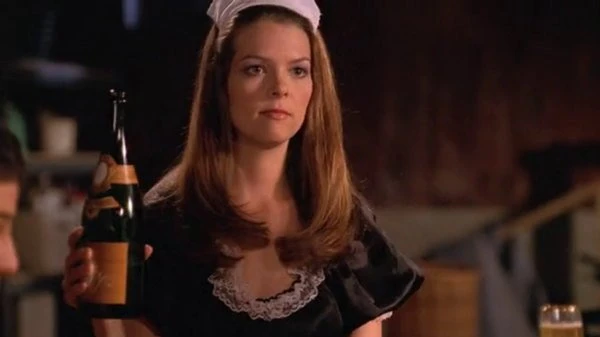
Next up, though, is the excellent “Dead Things,” which steps up the Trio plotline in a terrifying way. Warren invents a “cerebral dampener,” which will allow them to place any woman in a trance so that she becomes their willing slave. Just to make this idea even more disgusting, Warren immediately tracks down his ex, Katrina (Amelinda Embry, returning from 5.15, “I Was Made To Love You”). Even the other two villains think this is messed-up, and when the control begins to fade, just as Warren is taking Katrina to the bedroom, they are confronted with the reality of their actions: “You bunch of little boys playing at being men? Well, this is not some fantasy! It's not a game, you freaks! It's rape!”
It's a spectacularly powerful moment, with both Jonathan and Andrew barely able to accept the hard truth of her statement, a stark parallel to the many, many men who remain unable to grasp or accept the concept of consent. Worse, though, is Warren, who simply doesn't care. When Katrina tries to escape and tell the police, the three try to violently restrain her, before Warren smashes her round the head with a bottle, killing her. The entire sequence is a sudden, brutal illustration of how dangerous the Trio's villainy is, and a real insight into Warren's misogyny. The trio try using magic to frame Buffy for the death, to the point where she is convinced she is culpable, but this fails. Nonetheless, the Trio suddenly go from a joke to a genuine threat, with Warren, in spite of being a mere human, perhaps being the clearest and most obvious antithesis to Buffy. Who else would hate a powerful warrior woman more than an angry and threatened misogynist?
In the same episode, Buffy tells Tara that Spike is able to hurt her, leading her to investigate what went wrong with her resurrection. The answer is something of a let-down; Buffy is essentially out-of-phase with reality, so Spike's chip doesn't recognise her. Although relieved that she is indeed fully human, Buffy breaks down and confesses everything to Tara about her relationship with Spike. She thinks something has to be wrong with her, otherwise she wouldn't let him do the things he does to her or use him the way she has been. There's something particularly poignant that the only member of the gang she can confide in is Tara, who has always remained something of an outsider to the group. Tara is probably the most understanding and trustworthy of them, but is also a step removed for Buffy.
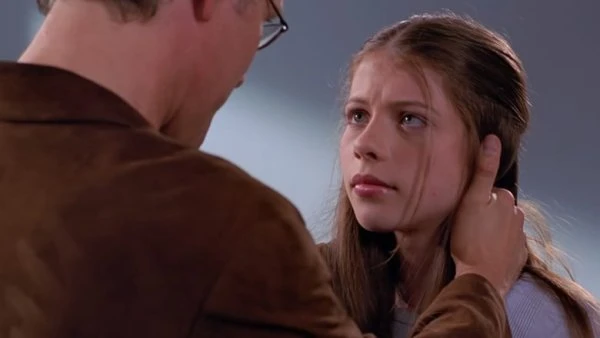
6.14, “Older and Far Away,” revolves around the traditionally catastrophic event of Buffy's birthday, but is actually a Dawn focused episode. With Buffy, between work and slaying, spending more and more time away, Dawn feels neglected. After all, everyone in her life has either left, died, or ended up overwhelmed by the supernatural, so it's not surprising she's feeling a bit abandoned. When speaking to her guidance counsellor, Dawn wishes that people would stop leaving. Unfortunately, the counsellor is actually Halfrek, a vengeance demon and Anya's best friend from her cursing days. Halfrek is played by Kali Rocha, who previously played Cecily, Spike's unattainable love interest, in 5.7, “Fool for Love,” before playing Hallie in multiple episodes this season. The script never comes out and says they're the same character, but Halfrek and Spike share a very awkward moment of recognition when they both find themselves trapped within the Summers’ house during Buffy's birthday party. With the gang and assorted uncomfortable guests terrorised by a demon that's found itself trapped as well, Willow desperately trying to avoid doing magic, and Dawn's kleptomaniac tendencies finally uncovered, tensions reach breaking point.

This is followed by a couple of important but average episodes. 6.15, “As You Were,” sees Buffy's past catch up with her when her ex, Riley Finn (Marc Blucas), arrives in Sunnydale on the trail of a particularly nasty nesting demon. The clash between Riley's presence, representing Buffy's old life, and her dreary current existence (he recruits her straight from Doublemeat Palace) is painfully eye-opening. To make it all the more awkward, Riley is accompanied by his new wife Sam (Ivana Miličević – Banshee, The 100), a hypercompetent black ops soldier. Riley reveals that they've been tracing a supernatural dealer named the Doctor (not that one) who is holding eggs for the demon, and he believes it's Spike. He manages to walk in on Buffy and Spike at it, which goes down about as well as you'd expect. The cast all perform strongly, which sells Riley's better, post-Buffy life well, and makes it understandable why Buffy decides to finally break things off with Spike. In spite of the major events, though, the episode just isn't that memorable.
6.16, “Hell's Bells,” is the long-awaited wedding episode, and they're always good for a bit of drama, right? In this case, the big event is played more for laughs, with plenty of ridiculous misunderstandings and arguments, as Anya's friends, who are demons, and Xander's family, “who are monsters,” try to get along. There's an ongoing joke about Anya's people being circus folks, which wears thin quickly, while Buffy, Dawn and Tara, as bridesmaids, try their best to keep Anya calm when Xander gets cold feet. There's an attempt at serious drama, as Xander is approached by an old man who claims to his future self, who shows him visions of the miserable and abusive future he and Anya will have together.
Veteran actor George D. Wallace (Radar Men from the Moon, Forbidden Planet, Gunsmoke) has a good turn as the old man, but the idea that he's Xander from the future is hard to credit since he looks absolutely nothing like Nicholas Brendon, and is about a foot shorter. It turns out that he's nothing but one of Anya's former victims, out for revenge, but it's enough to scare Xander to call off the wedding, since he's already frightened, he'll become an angry drunk like his father (Casey Sander). The comedy swallows up the drama, though, and frankly the comedy doesn't work so well. It's a shame such an important episode is such a fluff.

The following episode, “Normal Again,” is a massive upswing in quality, and kicks the season into high gear for a powerful run to the finish. “Normal Again” sees the Trio set a demon on Buffy who poisons her with a hallucinogenic venom, which makes her believe she is confined to an asylum, with her life in Sunnydale nothing more than an extended hallucination. Hanging on a powerful performance by Gellar, it's one of the most unsettling episodes of the series, one that genuinely makes you question which of Buffy's lives is the real one. It's a very clever script which lampshades the many oddities and inconsistencies that have crept into the series over the years. The more absurd moments are picked up as evidence that Buffy's delusion is crumbling – most notably, the sudden appearance of a sister, who had to be contrived to fit the existing narrative. The script even shines a light on the positioning of the Trio as the main villains, on how Buffy's fantasy has degraded from fighting all-powerful demons to a bunch of scared little men.
Other elements are built in cleverly; Buffy's death between seasons is incorporated as a period when her treatment was working and she returned to lucidity, before slipping back into her fantasy world. It's sold well by the return of Kristine Sutherland as Buffy's mother Joyce, and surprisingly, Dean Butler as her rarely seen father, Hank. The episode falls down somewhat as it keeps jumping back to real life in Sunnydale. While the brutal ending keeps you questioning whether Buffy's catatonic existence in the asylum is real, it's ultimately hard to believe it when we're continually brought back to the main narrative. It's a pity, because reworked just slightly, this episode could have been near perfect.
6.18, “Entropy,” sees everything hit the fan, in a sequence of events that spiral to the devastating finale. Anya and Xander try and fail to repair their relationship, which could have ended very badly for Xander, as Anya has taken an offer to become a vengeance demon once again. However, she is unable to curse Xander herself, and turns to Spike, in an attempt to convince him to wish something horrible on Xander. Meanwhile, the Trio start to show the strain, as Jonathan questions their actions and Warren becomes increasingly unhinged. The gang discover that the Trio have installed cameras to watch Buffy, and are able to patch into the feed, only to see Anya and Spike, drowning their sorrows at the Magic Box (with Giles's whiskey, the fiends) until they end up on top of each other. In the fallout, Buffy's affair with Spike finally comes out.

Still, on the plus side, Willow and Tara mend their relationship and spend the night together. The following episode, “Seeing Red,” sees Amber Benson in the opening titles at last. This is one of the cruellest jokes of the series, as this episode turns out to be perhaps the most heart-wrenchingly brutal in the entire series, ending with Tara's sudden, violent death.
That's just the end of the episode. Before then, Spike tries to make up with Buffy, and when she refuses, forces himself on her, in a very real and upsetting attempted rape scene. It's a truly shocking scene, a very human moment of violence amongst the usual fantasy fare. Marsters was reportedly deeply shaken by filming it, and that's reflected in his performance afterwards. Torn between his two natures, angry at himself both for attacking Buffy, and for backing off, he is trapped between evil and humanity. Spike leaves Sunnydale, vowing to return a changed man. Meanwhile, as the Trio falls apart, Warren nonetheless takes possession of a magical orb that grants him incredible strength. An already-wounded Buffy is unable to take him down, until Jonathan finally betrays him, destroying the orb and rendering him powerless. Later, in Buffy's garden, she and Xander reconcile after recent events, only for the fugitive Warren to storm in and shoot her. A stray bullet goes through the upstairs window, killing Tara, leaving Willow, consumed by grief and rage.
With an astonishing amount of violence perpetrated by men against women, in a far more realistic and mundane fashion than the series usually shows, this was understandably a controversial episode. As well as the sexual violence against Buffy, which was made harder to watch by being filmed just as much from Spike's point-of-view, the murder of Tara was shocking. Given that it occurs just after she and Willow make up and spend a day making love, it smacks of the tired “kill-your-gays” trope, whereby LGBT characters are so often killed off, either as expendable characters, or even as a judgment on their behaviour. In this instance, though, it's a sudden, violent intrusion to a positive and real same-sex relationship, and at no point does is feel like it was done because the characters aren't valued or respected. Indeed, it's that we've come to care so much for Willow and Tara's relationship that makes it so tragic.
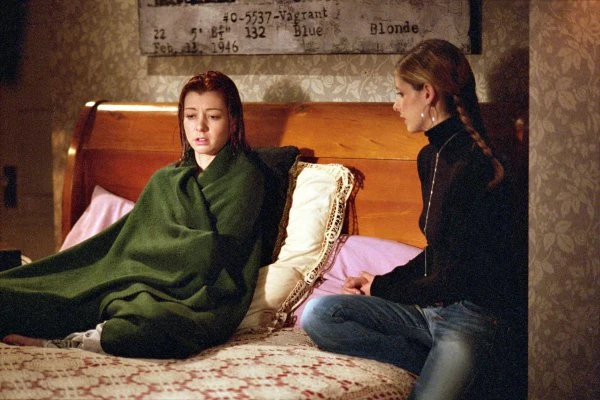
Tara's death breaks Willow, and her hard-fought stability and self control are lost in an instant. Consumed by rage and grief, Willow allows magic to overcome her completely. In the first moments of the next episode, “Villains,” Willow summons nothing less than the avatar of Osiris, trying to resurrect Tara as she did Buffy, only to be rebuked, as Tara's death was wholly by natural, human means. In response, Willow furiously inflicts pain on the demon and banishes it, a frightening display of power beyond anything we've seen from her before. What follows is an astonishing trilogy of episodes in which we follow Willow's fall to darkness.

Through the season, it didn't seem that the Trio were dangerous enough to be the Big Bad. In the last episodes, Warren proves that he truly is a threat, one that genuinely threatens the status quo like little before. His actions upend the whole season, and suddenly we realise that he was never the Big Bad – it was going to be Willow all along.
It's a genuinely brave move for the series, pushing one of the most beloved, and most noble characters beyond breaking point, to where she is almost unrecognisable. It's thanks to an excellent performance by Hannigan that the enraged witch who plagues the other characters across the final episodes is still recognisable as Willow. There had been hints at a possible darkness in the character before, but they were fleeting, or could be written off as outliers, events in extremis. (Not for the first time, the “real” Willow displays traits disconcertingly like her vampiric alter ego from the third season.) We never could have imagined that she could fall this far, though, and it could easily have failed if Hannigan wasn't so strong in the role.

While Warren celebrates his triumphant murder of the Slayer, Buffy is rushed to hospital, and Willow, learning from Xander who is responsible, goes after him. In her anger, she doesn't even mention what's happened to Tara; horrifically, it's Dawn who finds her body. When Warren learns that Buffy is still alive, he runs to Rack, the seedy warlock who supplies the Sunnydale supernaturals, only to be warned that it's Willow he really needs to be running from. Willow absorbs all the magic in the Magic Box, upping her formidable power even further, then proceeds to heal Buffy. However, she abandons her when she and Xander refuse to help her track down and kill Warren. This already suggests that Willow has fallen far from the heroes' moral centre, since killing human beings has long stood as the uncrossable line for Buffy. In a truly unsettling sequence, Willow pursues Warren into woods, swatting aside any magic he's acquired, and murders him horribly – slowly forcing the bullet that killed Tara through his body, then skinning him alive. It's quite the most brutal action we've seen from any character on the series, a shockingly dark path to follow.
The penultimate episode, cleverly titled “Two to Go,” sees Willow pursue Andrew and Jonathan, her bloodlust not remotely sated by Warren's death. The mission now becomes one to stop Willow however possible, with Buffy positioned as all that can stand between her and further carnage. Buffy breaks the now imprisoned pair out of jail with the help of Anya and her demonic powers. Willow pays another visit to Rack, who tries it on with her (clearly he's keen on her evil goth look), leading her to simply drain all the magic from him and kill him. Each step serves to increase Willow's power, and to distance her further from humanity. Dawn arrives and tries to talk sense into her, and if it weren't for Buffy's timely arrival, the sorceress would have reduced Dawn back into the formless energy she used to be. Finally, an all-on confrontation in the Magic Box almost leads to victory for Willow, until the episode ends on one of the series' greatest punch-the-air moments: the surprise appearance of Giles, who knocks her down with a powerful bolt of magic.

The final part, “Grave,” offers our heroes a brief respite as Willow is held captive while they try to work out what to do with her, during which time Buffy sums up the bits of the season that Giles has missed, causing him to burst out laughing at her. The lull doesn't last long, and soon Willow has freed herself, leading to a huge magical battle with Giles, in which Willow wipes the floor with him and drains all his power (which he'd only borrowed from a coven of English witches in the first place). Overwhelmed by the power, Willow is able to sense... well, everything, it seems, and is so horrified by all the suffering in the world that she decides the only thing to do is to end everything for good.
By escalating events to end-of-the-world levels, this puts “Grave” on-a-par with previous season-enders, but it also feels unnecessary. Turning Willow into a villain was already a huge event, and making her a world-ending threat feels like a step too far. While it works, perhaps, as a metaphor for depression, and the sudden, overwhelming desire to end everything that can overcome those who suffer with it, it takes some of the focus away from Willow and what her character is going through. The method of ending the world is pretty mediocre too; Willow raises some demon's buried temple, which will channel all her magic and then something dreadful will happen. The details aren't really important. It's just something that happens to raise the threat level to maximum.
However, it does lead to a touching and very different resolution, one that, uniquely for the series, involves no bloodshed. Xander, already bruised and bloodied from the events of the last few episodes, confronts Willow, standing between her and the temple and refusing to move. He talks to her about an event in their childhood, reminding her of her humanity, and vows to stay by her side through everything. She lashes out at him every time he tells her he loves her, until she finally breaks down in his arms, returning back to her normal, unblackened self. It's a beautiful moment, one that puts the emphasis on the characters' relationship rather than grand gestures, and one that only Xander, as the most mundane and human of the main characters, could deliver.
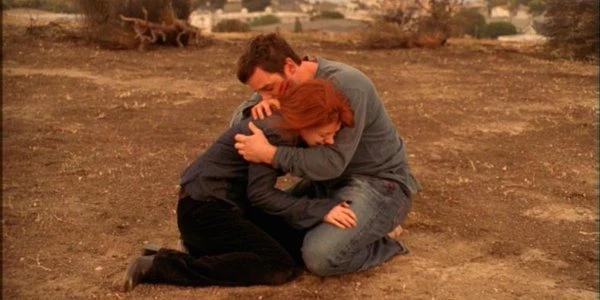
Meanwhile, a bloodily-beaten Giles senses what's happening, revealing to Anya that this was his plan all along, and that allowing Willow to absorb his natural magic allowed her to reconnect with her humanity, and overcome the dark magic she'd already absorbed. A bit of a gamble, considering that it very nearly caused her to end the world, and perhaps something he should have mentioned to someone earlier. More effectively, Buffy – needing to be kept out of the way so that Xander can save the day – is buried underground along with Dawn, facing some hastily constructed mud monsters. Dawn holds her own against the creatures – she has been watching Buffy fight for years after all – signifying her maturity. Finally, they climb out of the hole together, a triumphant reworking of Buffy's earlier escape from her grave.
It's a muddled but ultimately powerful finale for a season that has itself been something of qualified success. To revolve the core story around depression, addiction, despair and abuse was a brave move, and one that pushed the series fully into adulthood. The sixth season is the one that deviated most sharply from Buffy the Vampire Slayer's angst-ridden but ultimately positive ethos, and its origins as a teen show, but in the end, came through and showed that there's always room to move past the worst parts of life. It's understandable why it's not a favourite for many, in spite of some incredible moments, but it's certainly worthwhile on the whole.
Still, there's one character whose story truly shows that anyone, when given the chance, can become something more than they were. While Willow has been threatening Sunnydale, Spike has been notable by his absence. A parallel plotline sees him travel to the depths of Africa, where he faces some horrific trials at the behest of a particularly nasty demon, all so he can be “fixed” and give Buffy “what she deserves.” After several episodes of this, the final scene of the season sees Spike, bloodied like we've never seen him before, finally rewarded with what he came for: his soul. The seventh season would bring the series to a climax, with a story that was as much Spike's as it was Buffy's.
Published on May 25th, 2023. Written by Daniel Tessier for Television Heaven.


